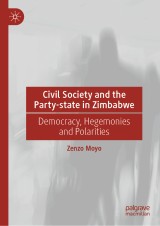Details
Civil Society and the Party-state in Zimbabwe
Democracy, Hegemonies and Polarities|
117,69 € |
|
| Verlag: | Palgrave Macmillan |
| Format: | |
| Veröffentl.: | 21.08.2024 |
| ISBN/EAN: | 9789819752546 |
| Sprache: | englisch |
Dieses eBook enthält ein Wasserzeichen.
Beschreibungen
<p>The book utilises Gramsci’s concepts of hegemony, counter-hegemony, organic intellectuals, and integral state to interrogate how modes of engagement between the state and civil society have contributed to a polarised polity in Zimbabwe, and in turn how this has impacted democratisation processes. This was achieved by analysing intra-civil society interactions and state-civil society relations, which established deep polarised relationships that can be traced back to the liberation struggle. It also interrogates ideologies that drive these polarised relations, and how, together with material benefits from donors and the party-state, these relations impact ordinary people’s modes of existence. One of the arguments that emerge from the book is that political polarisation in Zimbabwe has now morphed into an established political culture that has played a huge role in the retardation of democratic struggles. It uses ideas of entangled modernities and travelling theory to cast doubt on the belief that civil society is the ‘missing key’ in the democratisation of developing countries.</p>
<p>Chapter 1: Civil society, state, hegemony and Gramsci in the modern world.- Chapter 2: The liberation movement, polarisation culture and civil society in Zimbabwe.- Chapter 3: The party-state, labour and student movements and democratisation in Zimbabwe.- Chapter 4: Human Rights and the Constitutional Movement in Zimbabwe.- Chapter 5: NGOs, local state and communities at subnational level – The case of Mangwe District.- Chapter 6: Matabeleland Question: Marginalisation, uneven ‘democracy’ and exclusion.- Chapter 7: A faltering counter-hegemony – Towards a conclusion.</p>
<p>Zenzo Moyo holds an MA and a PhD in Development Studies from the University of Johannesburg. He is currently conducting independent research on civil society, poverty reduction, governance, political developments and democracy in Zimbabwe and other countries in Southern Africa. He has worked as a lecturer at the University of Johannesburg (2016-2019) as well as a Senior Researcher at the Mapungubwe Institute for Strategic Reflection (MISTRA) in Johannesburg (2019-2021). He is still an associate researcher at both the University of Johannesburg and MISTRA</p>
<p>The book utilises Gramsci’s concepts of hegemony, counter-hegemony, organic intellectuals, and integral state to interrogate how modes of engagement between the state and civil society have contributed to a polarised polity in Zimbabwe, and in turn how this has impacted democratisation processes. This was achieved by analysing intra-civil society interactions and state-civil society relations, which established deep polarised relationships that can be traced back to the liberation struggle. It also interrogates ideologies that drive these polarised relations, and how, together with material benefits from donors and the party-state, these relations impact ordinary people’s modes of existence. One of the arguments that emerge from the book is that political polarisation in Zimbabwe has now morphed into an established political culture that has played a huge role in the retardation of democratic struggles. It uses ideas of entangled modernities and travelling theory to cast doubt on the belief that civil society is the ‘missing key’ in the democratisation of developing countries.</p>
<p><strong>Zenzo Moyo </strong>holds an MA and a PhD in Development Studies from the University of Johannesburg. He is currently conducting independent research on civil society, poverty reduction, governance, political developments and democracy in Zimbabwe and other countries in Southern Africa. He has worked as a lecturer at the University of Johannesburg (2016-2019) as well as a Senior Researcher at the Mapungubwe Institute for Strategic Reflection (MISTRA) in Johannesburg (2019-2021). He is still an associate researcher at both the University of Johannesburg and MISTRA</p>
<p><strong>Zenzo Moyo </strong>holds an MA and a PhD in Development Studies from the University of Johannesburg. He is currently conducting independent research on civil society, poverty reduction, governance, political developments and democracy in Zimbabwe and other countries in Southern Africa. He has worked as a lecturer at the University of Johannesburg (2016-2019) as well as a Senior Researcher at the Mapungubwe Institute for Strategic Reflection (MISTRA) in Johannesburg (2019-2021). He is still an associate researcher at both the University of Johannesburg and MISTRA</p>
Discusses nature and extent of civil society polarisation Examines effect this polarisation has had on the quest for democratization in Zimbabwe Emphasizes that this polarisation phenomenon and quest for hegemony have been integral to the democratization question in Zimbabwe
Diese Produkte könnten Sie auch interessieren:

Impact of Social Media on Social Cohesion. Disinformation & Hate Speech during the Ethiopian Civil War (2020-2022)

von: Netsanet Feleke Balkew

36,99 €

















